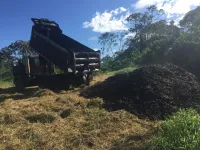Long-term space travelers will need high-intensity exercise to protect heart health
Circulation Journal Report
2021-03-29
(Press-News.org)
DALLAS, March 29, 2021 -- As NASA seeks to build a lunar outpost, visit Mars and commercialize spaceflight, the long-term effects of weightlessness on the human heart are of critical importance, according to researchers. By analyzing data from astronaut Scott Kelly's year in space and comparing it to information from extreme long distance, which simulates weightlessness, swimming of Benoît Lecomte, researchers found that low-intensity exercise was not enough to counteract the effects of prolonged weightlessness on the heart, according to new research published today in the American Heart Association's flagship journal Circulation.
Each time a person sits or stands, gravity draws blood into the legs. The work the heart does to keep blood flowing as it counters Earth's gravity helps it maintain its size and function. Removing gravitational effects causes the heart to shrink.
Researchers examined data from retired astronaut Scott Kelly's stint aboard the International Space Station from 2015 to 2016 and elite endurance swimmer Benoît Lecomte's swim across the Pacific Ocean in 2018.
In this new study, researchers evaluated the effects of long-term weightlessness on the structure of the heart and to help understand whether extensive periods of low-intensity exercise can prevent the effects of weightlessness.
"The heart is remarkably plastic and especially responsive to gravity or its absence. Both the impact of gravity as well as the adaptive response to exercise play a role, and we were surprised that even extremely long periods of low-intensity exercise did not keep the heart muscle from shrinking," said Benjamin D. Levine, M.D., the study's senior author and a professor of internal medicine at UT Southwestern Medical Center and director of Texas Health Presbyterian's Institute for Exercise and Environmental Medicine, both in Dallas.
The research team examined the health data of Kelly's year in space aboard the International Space Station and Lecomte's swim across the Pacific Ocean to investigate the impact of long-term weightlessness on the heart. Water immersion is an excellent model for weightlessness since water offsets gravity's effects, especially in a prone swimmer, a specific swimming technique used by long-distance endurance swimmers.
Kelly exercised six days a week, one to two hours per day during his 340 days in space, March 27, 2015 to March 1, 2016, using a stationary bike, a treadmill and resistance activities. Researchers hoped Lecomte's 159-day swim from June 5 to Nov. 11, 2018 of 1,753 miles from Choshi, Japan, during which he averaged nearly six hours a day swimming, would keep his heart from shrinking and weakening. Doctors performed various tests to measure the health and effectiveness of both Kelly's and Lecomte's hearts before, during and after each man embarked on his respective expeditions.
The analysis found:
Both Kelly and Lecomte lost mass from their left ventricles over the course of the experiences (Kelly 0.74 grams/week; Lecomte 0.72 grams/week).
Both men suffered an initial drop in the diastolic diameter of their heart's left ventricle (Kelly's dropped from 5.3 to 4.6 cm; Lecomte's reduced from 5 to 4.7 cm.).
Even the most sustained periods of low-intensity exercise were not enough to counteract the effects of prolonged weightlessness.
Left ventricle ejection fraction (LVEF) and markers of diastolic function did not consistently change in either individual throughout their campaign.
This case study examined two extraordinary feats by two unique individuals. While it is important to understand how the body responds to extreme circumstances, more study is required to understand how these results can be applied to the general population. Analysis of Lecomte's cardiac MRIs from before and after his swim are forthcoming and will also be helpful for the researchers further understand whether long-term effects of weightlessness can be reversed. Kelly did not receive cardiac MRIs, and currently, there are no further follow up plans for him.
INFORMATION:
Co-authors are James P. MacNamara, M.D., M.S.C.S.; Katrin A. Dias, Ph.D.; Satyam Sarma, M.D.; Stuart M.C. Lee, Ph.D., David Martin, M.S., R.D.C.S.; Maks Romeijn, M.D.; and Vlad G. Zaha, M.D., Ph.D.
Additional Resources:
Available multimedia is on right column of release link - ADD LINK HERE
After March 29, view the manuscript online.
Astronauts less likely to faint on Earth if they exercise in space; findings may help others with fainting issues
Follow AHA/ASA news on Twitter @HeartNews
Follow news from the AHA's flagship journal Circulation @CircAHA
Statements and conclusions of studies published in the American Heart Association's scientific journals are solely those of the study authors and do not necessarily reflect the Association's policy or position. The Association makes no representation or guarantee as to their accuracy or reliability. The Association receives funding primarily from individuals; foundations and corporations (including pharmaceutical, device manufacturers and other companies) also make donations and fund specific Association programs and events. The Association has strict policies to prevent these relationships from influencing the science content. Revenues from pharmaceutical and biotech companies, device manufacturers and health insurance providers are available here, and the Association's overall financial information is available here.
About the American Heart Association
The American Heart Association is a relentless force for a world of longer, healthier lives. We are dedicated to ensuring equitable health in all communities. Through collaboration with numerous organizations, and powered by millions of volunteers, we fund innovative research, advocate for the public's health and share lifesaving resources. The Dallas-based organization has been a leading source of health information for nearly a century. Connect with us on heart.org , Facebook , Twitter or by calling 1-800-AHA-USA1.
ELSE PRESS RELEASES FROM THIS DATE:
2021-03-29
DALLAS, March 29, 2021 -- Adults with periodontitis, a severe gum infection, may be significantly more likely to have higher blood pressure compared to individuals who had healthy gums, according to new research published today in Hypertension, an American Heart Association journal.
Previous studies have found an association between hypertension and periodontitis, however, research confirming the details of this association is scarce. Periodontitis is an infection of the gum tissues that hold teeth in place that can lead to progressive inflammation, bone or tooth loss. Prevention and treatment of periodontitis ...
2021-03-29
DALLAS, March 29, 2021 -- Six pregnancy-related complications - high blood pressure, gestational diabetes, preterm delivery, small-for-gestational-age delivery, pregnancy loss or placental abruption - increase a woman's risk for developing cardiovascular disease (CVD) later in life, according to a new scientific statement from the American Heart Association, published today in the Association's flagship journal Circulation. The statement calls for vigorous prevention of these risk factors and primary prevention of CVD for women who experience these complications as they transition out of pregnancy and postpartum care into primary care, with continued follow-up to monitor CVD risk throughout life.
About 10% to 15% ...
2021-03-29
In a new publication in Nature Communications, associate professor of Plant Science at the University of Maryland Yiping Qi continues to innovate genome editing and engineering in plants, with the ultimate goal of improving the efficiency of food production. His recent work contributes six novel variants of CRISPR-Cas12a that have never before been proven in plants, testing them first in rice as a major global crop. In addition to allowing for a much broader scope of possible gene editing targets, these new tools can edit many different sites in the genome at once, or even repress gene expression to tone down undesirable traits. These patent-pending tools greatly expand the scope of what CRISPR-Cas12a can do in plants, which ...
2021-03-29
-- Black middle-aged adults had an incidence rate of stroke 4 times higher than that of white middle-aged adults, according to a Kaiser Permanente study published March 29 in Hypertension.
The large national prospective study highlights the need to raise awareness among young and middle-aged Black adults about the impact of high blood pressure, called hypertension, on stroke, the research team said.
"What we found striking in this study was that the incidence of stroke began to increase rapidly starting at around age 40 for Black adults," said the study's co-author Jamal S. Rana, MD, PhD, an adjunct investigator with the Division of Research at Kaiser Permanente in Northern California, and ...
2021-03-29
Despite the enormous amount of research over the decades into lasers and their applications, there have been few ways to accurately, efficiently, and directly observe fine details of their interactions with materials. For the first time, researchers have found a way to acquire such data from a production laser using low-cost equipment that could vastly improve the accuracy of items cut or etched with lasers. Given the ubiquity of lasers, this could have wide-ranging implications in laboratory, commercial and industrial applications.
Lasers are used in an extraordinarily wide range of applications in the modern world. ...
2021-03-29
A team of Australian and German researchers has discovered a novel pathway that plants can use to save water and improve their drought tolerance.
The research published today in Nature Communications shows that the molecule GABA (gamma-aminobutyric acid), most commonly associated with relaxation in animals, can control the size of the pores on plant leaves to minimise water loss.
Matthew Gilliham, Director of the Waite Research Institute at the University of Adelaide, who led the research team, said they found: "GABA minimised pore openings in a range of crops such as barley, broad bean and soybean, and in lab plants that produce more GABA than normal. ...
2021-03-29
Each human being is made of billions of cells. In order to ensure his survival, cells must coordinate with each other and attach in the right place to perform their tasks. Scientists from the University of Geneva (UNIGE), Switzerland, in collaboration with the University of Tampere in Finland, have highlighted the key role of a protein called paxillin, which enables cells to perceive their environment and anchor at the right place with the help of cellular "crampons". Indeed, without functional paxillin, the cell is unable to attach properly and slips continuously. These results, to be read in the journal Communications Biology, shed new light ...
2021-03-29
Noninfluenza respiratory viral infections (NIRV) are associated with illness and death rates similar to influenza in hospitalized adults, according to new research in CMAJ (Canadian Medical Association Journal).
In a study of 2119 adults admitted to two hospitals over three seasons (2015-2018) in Edmonton, Alberta, and Toronto, Ontario, with confirmed viral acute respiratory infections, more than half (54.6%) were NIRV infections compared with influenza viruses (45.4%). Among patients with NIRV infections, 21.1% needed respiratory support, 18.2% required lengthy hospital stays and 8.4% died within 30 days of diagnosis. About 15% of NIRV infections were acquired in hospital.
"These findings show that clinical ...
2021-03-29
A new study finds that coffee pulp, a waste product of coffee production, can be used to speed up tropical forest recovery on post agricultural land. The findings are published in the British Ecological Society journal Ecological Solutions and Evidence.
In the study, researchers from ETH-Zurich and the University of Hawai`i spread 30 dump truck loads of coffee pulp on a 35 × 40m area of degraded land in Costa Rica and marked out a similar sized area without coffee pulp as a control.
"The results were dramatic" said Dr Rebecca Cole, lead author ...
2021-03-29
Twenty percent of high school students have easy access to a handgun, according to a new study from the Colorado School of Public Health on the University of Colorado Anschutz Medical Campus.
In the study published today in The Journal of Pediatrics, the researchers examined the prevalence of handgun access among adolescents in Colorado and explored individual and geographic characteristics, as well as related health factors.
"Our findings highlight that it is relatively easy to access a handgun in Colorado for high school students. This finding, combined with ...
LAST 30 PRESS RELEASES:
[Press-News.org] Long-term space travelers will need high-intensity exercise to protect heart health
Circulation Journal Report




